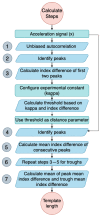Person-Specific Template Matching Using a Dynamic Time Warping Step-Count Algorithm for Multiple Walking Activities
- PMID: 38005449
- PMCID: PMC10675039
- DOI: 10.3390/s23229061
Person-Specific Template Matching Using a Dynamic Time Warping Step-Count Algorithm for Multiple Walking Activities
Abstract
This study aimed to develop and evaluate a new step-count algorithm, StepMatchDTWBA, for the accurate measurement of physical activity using wearable devices in both healthy and pathological populations. We conducted a study with 30 healthy volunteers wearing a wrist-worn MOX accelerometer (Maastricht Instruments, NL). The StepMatchDTWBA algorithm used dynamic time warping (DTW) barycentre averaging to create personalised templates for representative steps, accounting for individual walking variations. DTW was then used to measure the similarity between the template and accelerometer epoch. The StepMatchDTWBA algorithm had an average root-mean-square error of 2 steps for healthy gaits and 12 steps for simulated pathological gaits over a distance of about 10 m (GAITRite walkway) and one flight of stairs. It outperformed benchmark algorithms for the simulated pathological population, showcasing the potential for improved accuracy in personalised step counting for pathological populations. The StepMatchDTWBA algorithm represents a significant advancement in accurate step counting for both healthy and pathological populations. This development holds promise for creating more precise and personalised activity monitoring systems, benefiting various health and wellness applications.
Keywords: accelerometry; dynamic time warping; physical activity; step counting.
Conflict of interest statement
The authors declare no conflict of interest.
Figures







References
-
- Ryu U., Ahn K., Kim E., Kim M., Kim B., Woo S., Chang Y. Adaptive step detection algorithm for wireless smart step counter; Proceedings of the International Conference on Information Science and Applications; Pattaya, Thailand. 24–26 June 2013; pp. 1–4. - DOI
-
- Strath S.J., Kaminsky L.A., Ainsworth B.E., Ekelund U., Freedson P.S., Gary R.A., Richardson C.R., Smith D.T., Swartz A.M., American Heart Association Physical Activity Committee of the Council on Lifestyle and Cardiometabolic Health and Cardiovascular, Exercise, Cardiac Rehabilitation and Prevention Committee of the Council on Clinical Cardiology, and Council Guide to the assessment of physical activity: Clinical and research applications: A scientific statement from the American Heart Association. Circulation. 2013;128:2259–2279. - PubMed
MeSH terms
Grants and funding
LinkOut - more resources
Full Text Sources

